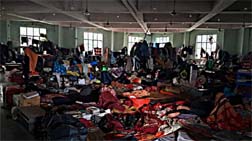C T Online Desk: The gonorooms at Dhaka University, initially intended for four occupants, now house a staggering 20-25 students each. With inadequate space and ventilation, students are forced to sleep in cramped conditions, exacerbating the already unbearable heat.
The situation is particularly dire at halls for girls, as there are no ceiling fans except at the “7th March Bhaban” of Begum Rokeya Hall. Some students claimed the hall administration did not want fans in girls’ rooms, fearing suicidal tendencies among the residents.
Returning to campus after the Eid holidays, the students were met with a sudden suspension of physical classes on April 21 due to the intense heat. With most unable to return home due to various reasons, including economic constraints and inability to access online classes from home, their plight has intensified.
University sources revealed that 123 rooms across 18 residential halls have been converted into gonorooms, accommodating over 2,300 students.
Dhaka University also has 18 halls and six hostels. Among them, five halls are for female students: Begum Rokeya Hall, Kabi Sufia Kamal Hall, Bangladesh-Kuwait Maitree Hall, Bangamata Sheikh Fazilatunnesa Mujib Hall, and Shamsun Nahar Hall.
Additionally, there are two hostels for female students: Nabab Foyzunnesa Chowdhurani Hostel and Shahid Athlete Sultana Kamal Hostel.
When asked why ceiling fans are not approved for the girls’ hall rooms, Dr Latifa Zaman, the provost of Samsunnahar Hall, said: “The university authorities have a long-standing practice of not using ceiling fans in all the girls’ halls due to lack of necessary structural arrangements.
“There’s no specific reason for not allowing ceiling fans. I don’t think it’s related to the female students’ suicidal tendencies. Since there are no ceiling fans in this intense heatwave, the issue should be addressed by the authorities. I will discuss the matter with them.”
She added: “If anyone wants to commit suicide, they can do it by any means. Counselling students could help reduce suicidal tendencies.”
Regarding life in the gonorooms, a first-year student and resident of Surja Sen Hall said: “The number of students in the gonorooms is higher than usual. The temperature in the gonoroom is elevated, and there’s a lack of adequate light and air. Additionally, the hall authorities do not allocate enough fans in each room, exacerbating the students’ suffering. If proper measures were taken by the hall authorities, the suffering of the students in the gonorooms would be greatly reduced.”
A gonoroom resident of Bijoy Ekattor Hall, asking not to be named, said: “Firstly, there are not enough fans in the gonorooms. Secondly, these rooms are not suitable for sleeping, as they were originally built as game rooms. Thirdly, there are too many people living in the same room, causing it to become stuffy. The air from fans also becomes hot before reaching us.”
In addition to physical discomfort, the heatwave has exacerbated the risk of infectious diseases, including diarrhoea, further straining the already compromised hygiene standards within the gonorooms. Maintaining physical distance to prevent disease transmission remains a challenge amidst the crowded living conditions.
The situation worsened last month when Kuwait Maitree Hall residents were instructed to vacate for renovation work. While some were relocated to alternative accommodations, around a hundred students found themselves crammed into the hall’s auditorium and TV room, enduring the heat amidst a water crisis exacerbated by renovation-related issues.
“We are facing an acute water crisis this summer. Dirty water is coming through the taps due to the renovation work of the hall. Although there is a ceiling fan in the auditorium, we feel very uncomfortable due to the enclosed and high roof,” said a resident of the hall, requesting anonymity.
Meanwhile, the hall administration has instructed them to remove necessary furniture from their rooms to make space.
Another resident of the hall, who did not want to be named, said: “This summer, there are 40 of us in the auditorium room. We are not able to bring our furniture here. We have been told that if the furniture is not removed, it will be thrown away by the staff.”
















